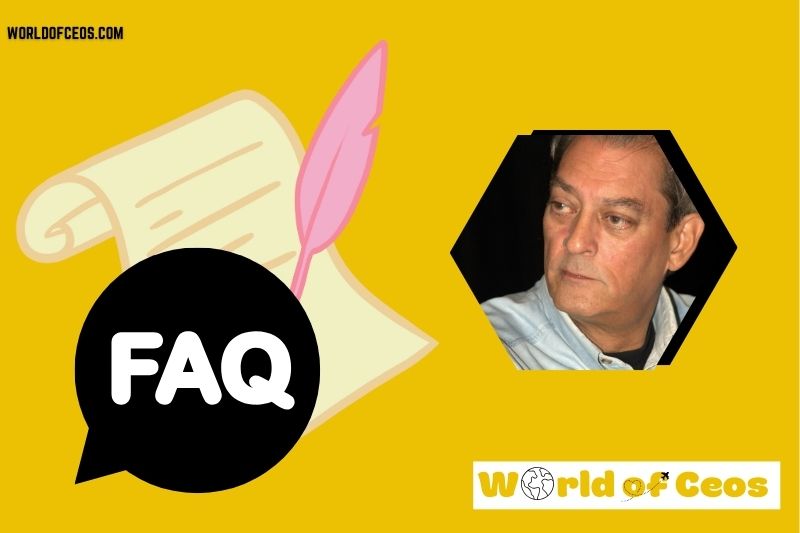Paul Auster, an acclaimed novelist and filmmaker, left an indelible mark on literature and cinema.
With a career spanning decades, his works have garnered critical acclaim and commercial success.
This article explores Paul Auster net worth, sources of wealth, and financial highlights, providing insight into the factors that shaped his financial success.
Quick Facts
| Fact | Detail |
|---|---|
| Real Name | Paul Benjamin Auster |
| Popular Name | Paul Auster |
| Gender | Male |
| Birth Date | February 3, 1947 |
| Age | 77 (Died: April 30, 2024) |
| Parents | Samuel Auster, Queenie Bogat |
| Siblings | Janet Auster |
| Birthplace | Newark, New Jersey, USA |
| Nationality | American |
| Ethnicity | Jewish, Austrian descent |
| Education | Columbia University (B.A., M.A.) |
| Marital Status | Married |
| Spouse | Siri Hustvedt (m. 1982–2024), Lydia Davis (m. 1974–1979) |
| Children | Sophie Auster, Daniel Auster |
| Dating | N/A |
| Net Worth | $20 million |
| Source of Wealth | Writing, filmmaking, translations |
| Height | 5 ft 9 in (1.75 m) |
What is the Net Worth of Paul Auster in 2024?

As of 2024, Paul Auster’s net worth is estimated at $20 million. This places him among successful literary figures who have not only shaped literature but also established significant financial legacies.
Compared to peers and contemporaries in writing and filmmaking, his wealth reflects both the artistic depth and commercial viability of his work.
Other notable individuals related to his field include:
- Siri Hustvedt
- Lydia Davis
- Salman Rushdie
- Don DeLillo
- J.M. Coetzee
- Art Spiegelman
- Wayne Wang
- Michael Mantler
- Shimon Peres
- Sophie Auster
For a detailed breakdown of the wealthiest authors, explore this comprehensive guide to literary success.
Paul Auster Wealth, Salary, and Finance Overview

Key Sources of His Wealth and Financial Achievements
Paul Auster’s wealth stemmed primarily from his prolific career as a novelist, filmmaker, and translator.
His books, particularly The New York Trilogy and 4 3 2 1, garnered global acclaim, being translated into more than 40 languages. This widespread appeal significantly contributed to his financial success.
Additionally, his ventures into filmmaking, such as directing Smoke and Lulu on the Bridge, not only added creative dimensions to his career but also generated substantial income.
Awards like the Independent Spirit Award further boosted his financial profile, while the recognition from the Prince of Asturias Award underscored his global influence.
Contributions from His Literary and Creative Career
Auster’s early career as a translator played a pivotal role in shaping his financial journey.
His translations of French literature and editorial work on anthologies, such as The Random House Book of Twentieth-Century French Poetry, provided a steady income during his formative years.
His ability to weave existentialism and personal identity into compelling narratives resonated with readers worldwide. Autobiographical works like The Invention of Solitude bridged the gap between personal and universal themes, elevating his stature in the literary world.
Recognition and Awards That Boosted His Career
Winning prestigious awards significantly enhanced Paul Auster’s reputation and income.
The Prince of Asturias Award and multiple IMPAC awards reflected his literary excellence, while the Independent Spirit Award for Smoke highlighted his filmmaking talent.
These accolades not only brought financial rewards but also cemented his position as a literary icon, attracting opportunities for collaborations and adaptations of his works.
Personal Ventures and Influence on Financial Growth
Auster’s partnerships with prominent figures, such as filmmaker Wayne Wang, and his involvement in NPR’s National Story Project demonstrated his versatility and commitment to storytelling.
These collaborations enriched his career and widened his audience base.
His family’s creative background, with his wife Siri Hustvedt being an accomplished author and his daughter Sophie Auster excelling as a singer, also contributed to a legacy that intertwined personal and professional success.
How His Work Reflects His Philosophical and Financial Legacy
Paul Auster’s exploration of universal themes like chance, identity, and meaning resonated deeply with readers.
His works combined accessible prose with philosophical depth, making them commercially successful while maintaining critical acclaim.
His ability to navigate multiple genres—literary fiction, crime, and absurdism—ensured a diverse audience and consistent financial returns.
FAQs About Paul Auster

What were Paul Auster’s most famous works?
He is best known for The New York Trilogy, 4 3 2 1, and The Music of Chance.
How did his family influence his career?
His wife, Siri Hustvedt, and daughter, Sophie Auster, brought artistic perspectives that complemented his work.
Which awards did he receive during his career?
He won the Independent Spirit Award, multiple IMPAC awards, and the Prince of Asturias Award.
What was Paul Auster’s educational background?
He earned B.A. and M.A. degrees in English and Comparative Literature from Columbia University.
Did he work in any other fields?
Yes, he was a translator of French literature and a filmmaker.
How did He balance writing and filmmaking?
Auster successfully transitioned between literature and film, creating a body of work that appealed to diverse audiences.
What themes defined his literary style?
His works often explored identity, chance, and existential dilemmas through postmodern narratives.
Where did He live?
He resided in Brooklyn, New York, for most of his life.
Conclusion
Paul Auster’s financial journey reflects a life dedicated to art and storytelling. From bestselling novels to award-winning films, his achievements continue to inspire.
Visit worldofceos.com to explore more about influential figures and their financial stories. Share your thoughts and spread the word!

